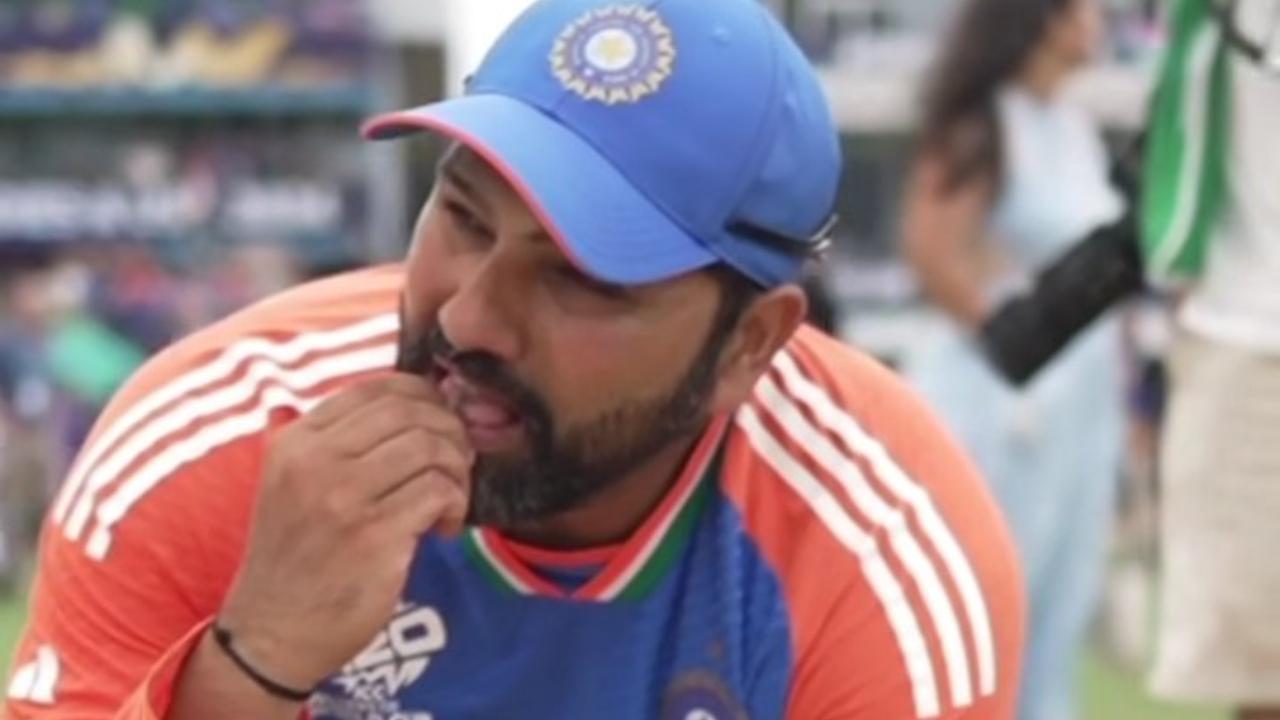Leading the Indian men's cricket team to their first global title in 11 years, Rohit Sharma, amidst the jubilant celebrations, quietly made his way to the pitch at Kensington Oval

Rohit Sharma delicately tasting a small handful of soil (Pic: Screengrab/ICC)
A momentous victory has the power to evoke a spectrum of emotions, and for Indian captain Rohit Sharma, the recent T20 World Cup 2024 triumph inspired a unique gesture reminiscent of Novak Djokovic's ritual at Wimbledon.
ADVERTISEMENT
Leading the Indian men's cricket team to their first global title in 11 years, Sharma, amidst the jubilant celebrations, quietly made his way to the pitch at Kensington Oval. There, he stooped down, picked up a small handful of soil, and delicately tasted it—a symbolic act to savor the essence of his team's achievement.
For ardent followers of the iconic Djokovic, such a sight would not be unfamiliar. The Serbian tennis maestro has a tradition of plucking blades of grass from Wimbledon's revered Centre Court and savoring them, a ritual that has become synonymous with his victories and captured vividly by photojournalists and videographers alike.
THIS IS OUR CAPTAIN ROHIT SHARMA...!!!! 🥺❤️
— Tanuj Singh (@ImTanujSingh) June 30, 2024
- Captain Rohit Sharma eating the soil of pitch after won the T20 World Cup Trophy. 🏆 (Video - ICC). pic.twitter.com/Rwm6iWtVmi
In today's era of digital storytelling, Sharma's gesture became instant "SM Gold" for the host broadcasters, who eagerly shared the video clip on their official Instagram platform. Not to be outdone, Wimbledon's official Instagram handle joined in, elevating their social media engagement by juxtaposing images of Djokovic and Sharma, celebrating their respective triumphs.
The parallel between the two athletes, Sharma and Djokovic, extends beyond their unique post-victory rituals. Both are esteemed captains in their fields, leading their teams with charisma and determination. Djokovic's ritual of consuming Wimbledon's grass has transcended mere superstition to become a celebrated tradition, capturing the imagination of fans and media alike. Likewise, Sharma's tasting of the Kensington Oval soil adds a new chapter to cricket's folklore, illustrating his deep connection to the venue and the momentousness of the occasion.
Also Read: Key highlights from the fourth week of the ICC T20 World Cup
The significance of these gestures lies not only in their symbolism but also in their portrayal in the digital age. Social media platforms have become a pivotal arena for athletes to connect directly with their global audience, offering glimpses into personal rituals and reflections on monumental achievements. For Sharma, the act of tasting victory is a personal acknowledgment of the sacrifices and dedication that culminated in India's T20 World Cup triumph.
As the images of Djokovic and Sharma circulated side by side on social media feeds, they sparked conversations about the intersection of sportsmanship, tradition, and modern media. Both athletes embody a blend of reverence for tradition and a forward-looking approach to engaging with their fan base, leveraging social platforms to share intimate moments of triumph and reflection.
In the wake of their respective victories, both Sharma and Djokovic stand as symbols of resilience and excellence in their disciplines. Their rituals, steeped in personal meaning and cultural resonance, serve as reminders of the enduring allure of sports and the profound impact of athletic achievements on a global scale.
Looking ahead, as sports continue to evolve and adapt to the digital age, athletes like Sharma and Djokovic will continue to shape the narrative, not only through their performances on the field but also through their engagement with fans across digital platforms. Their gestures, whether tasting soil or savoring grass, become part of a broader narrative that celebrates the human spirit's triumph over adversity and the universal language of sportsmanship.
 Subscribe today by clicking the link and stay updated with the latest news!" Click here!
Subscribe today by clicking the link and stay updated with the latest news!" Click here!







